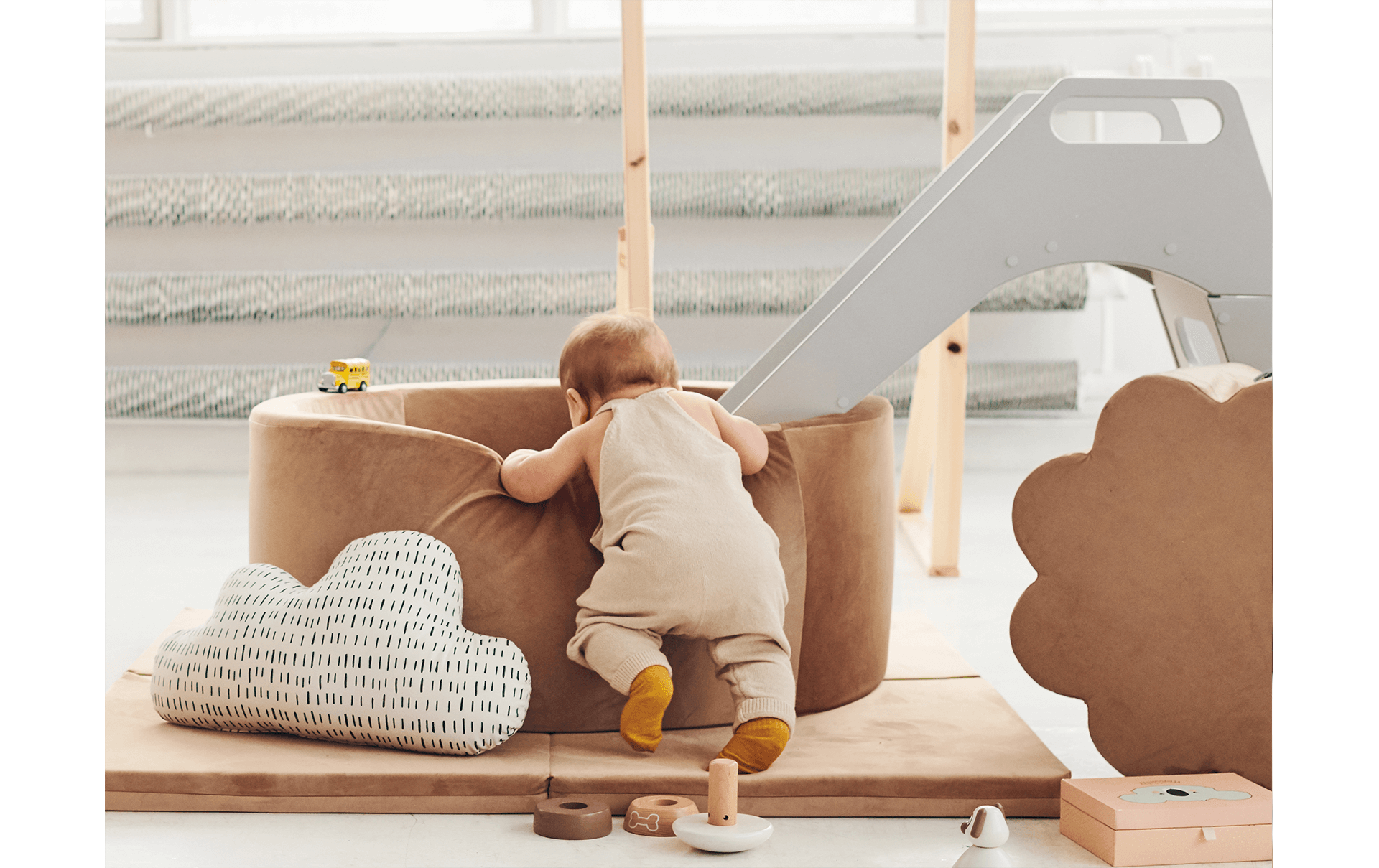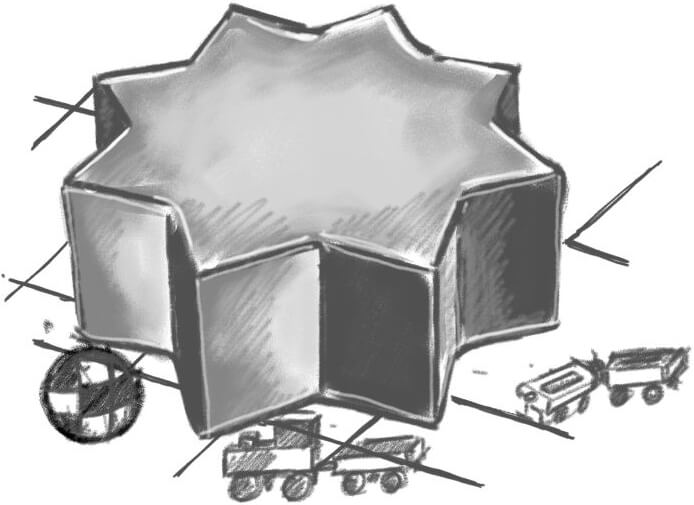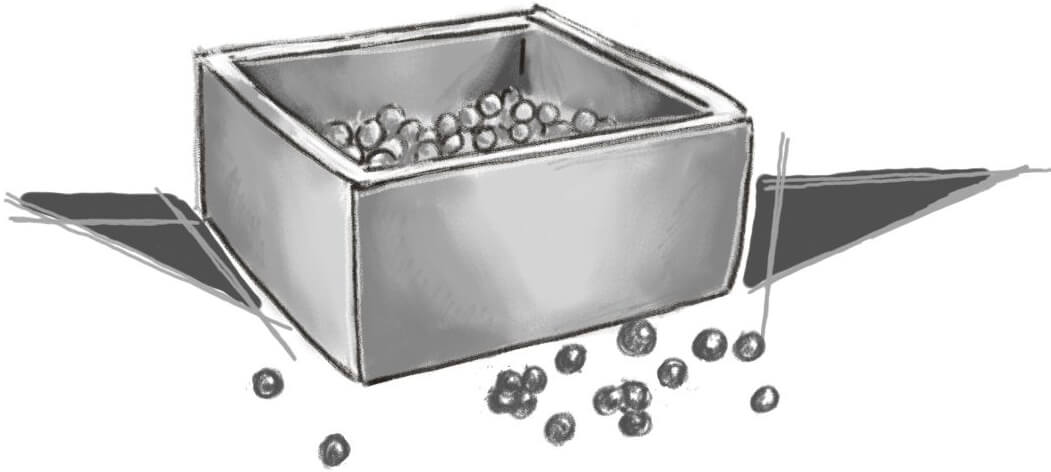Learning how to play independently
How to teach a child to play alone and why is it so important?

“When playing on their own, children show their emotions and share ideas without fear, they exercise their imagination and feel the joy of discovering themselves. It develops creativity. When they plan and implement their ideas, their confidence, attention and persistence in solving problems are also strengthened. “Dr Sheila Anderson
How to teach a child to play alone and why is it so important?
According to psychologists, learning a child to play independently begins in the neonatal period. Turning on the music boxes above the baby’s bed and leaving the room for a few minutes is the perfect way to get your baby used to independence. This time should be gradually extended. Over time, the toddler will understand that we are nearby and there is nothing to be afraid of.
Independent games are very important in their daily development, regardless of the age of our child. They primarily affect the development of his imagination, increase the level of concentration and self-esteem. They will also teach baby independence, which will certainly be useful in his mature life.
Every parent heard at least once a day from their children: “mom, I’m bored”, “I don’t know what to do”, “play with me”.
We want the best for our children, trying to be involved in their development from the very beginning of their lives. Also, we devote a lot of time to them. Every day, we show them how much we love them. Time spent with children is undoubtedly the most beautiful moment that we will remember for a lifetime. The first words, first steps, gestures and expressions are touching and make us laugh. We can enjoy these moments only because we are close to them.
However, all of us also need time for ourselves to rest, drink coffee, reflect or simply do nothing. Each of us has the right to do so. Don’t be persuaded that you are bad parents. Children expect 100% attention and commitment from us 24 hours a day. We are parents, not robots.
I went back to my childhood for a while … Do you remember your childhood?
We took care of ourselves and invented games, not having a pile of toys. We used the leaves as money, goblin leaves to make snail houses and cardboard boxes for dolls houses. These memories are priceless and cannot be replaced by anything … Unfortunately, these days, children grow up at different times. We raise children in the digital age. We have an “electronic” world that may be comfortable, but often very disastrous. Creative thinking, unfortunately, goes aside, and that’s why doesn’t allow them to play independently.
How to teach a child to play alone?
Start with small steps
- Don’t expect a child who is used to playing with you all the time to be able to take care of itself immediately. Teach it patience first.
- Your child needs to know what you will be doing while he is playing alone. Show it you have a basket full of clothes to iron or other home tasks. Explain to him that mummy also needs to rest sometimes in order to have more strength and that you will see it in 5 minutes.
- Do not extend this time right away. Do it gradually. Even when the child is having a great time on his own and is not calling you yet. I remember my daughter asking me: why do moms have to rest? I asked her: does she play with all the toys at the same time? My daughter looked at me with understanding and said: “I know, I understand now, it’s when my teddy bear sleeps and I play with other toys, it means that he is resting,”
- Maybe try to introduce a daily routine so that your toddler knows that he has to take care of himself at some point each day.
- When your reacts by crying because of your absence, explain why you need to leave, go to the kitchen or toilet for a moment, and that you will be back in a while. This way, it will start to get used to the fact that while you are not next to it, you are around and there is no need to be afraid.
- Another way to teach it to play independently is to do the same thing with your child simultaneously. Children learn by imitating others, from the very first days of their lives. We, parents, are the greatest authority for our children. It will be easier for a child if it will imitate its parent’s behaviour. It is worth offering the child activities that will be similar to those done by you. For example, if you are cooking dinner, let your son/daughter “cook” something for dad or its favourite teddy bear. Another time, tell it to cook something in its room.
Provide a feeling of security
- Some children experience fear when they are left alone in a room.
- Therefore, do not force anything against your child’s will.
- Show up every few minutes so that the child knows that even though you are not playing with it, you are right there. Sometimes it is enough to come to its room, put a plate with some sliced apples, smile or kiss and leave. The child then feels that although you are not in the room with him, you are still nearby.
Praise him without distracting him from the fun.
- Ideally, in the evening after reading a bedtime story, remind your child how it managed to play on its own and that you are very proud of it.
Don’t be upset with the baby
- When there’s a mess left in the room after playing alone. There are only toys that should back in their container, thanks to which you had time for home tasks or rest. It reminds me of a situation with my three-year-old daughter. One day, I asked her who is going to clean up this mess now? She put out her little hands and making cute eyes said: “Mummy, I would like to tidy it up, but how can I do with such small hands?” I must admit, I couldn’t be angry at her.
It’s also a good idea not to give your baby all the toys.
- Gradually giving or replacing them is better. Showing or taking everything out will make your child bored with its toys or teddy bears faster. Our point is that the child will always be interested in what its got in its room. Believe me, a soft teddy bear taken out after a week will give your child more joy than the one that’s on the shelf each day. It is almost as if it had received a completely “new” toy.
- We know it from our own experience. Each of us found a forgotten lipstick at the bottom of a purse. Dear mothers, I can imagine a smile on your faces.
Let’s also let the children wake up.
- According to psychologists, we need boredom because it triggers our creativity. It puts us in a state of reflection, an opportunity to reflect on what we are doing at the moment.
- Psychologists define it as a form of impulse that mobilizes and stimulates to action, on which we focus all our attention.
- Sometimes the children give us ideas. My daughter once told me: Mom, I have my teddy bears and dolls in my room, and you cook yourself in the kitchen. Since that time, she was giving me a teddy bear every day, which would accompany me when I ironed, cooked, or even when I was resting.
- Let’s listen to our children, they sometimes have better ideas than we do🙂
The ability to play independently is an amazing feature. Let’s spend time with our children, but do not forget about a moment for ourselves. Happy parent, happy child 🙂
Regards, Karolina
Uwaga, opóźnienia w realizacji zamówień
Kochani KlienciW związku z dużym zainteresowaniem naszymi produktami mogą wystąpić opóźnienia w realizacji zamówień.
Dokładamy wszelkich starań by zrealizować zamówienia tak, by dotarły jeszcze przed świętami. Z naszej strony gwarantujemy, że wszystkie zamówienia złożone do 17 grudnia trafią jeszcze pod choinkę. Przepraszamy za niedogodności, dziękujemy za wyrozumiałość.
Życzymy Wesołych Świąt

Are you sure you want to add an empty pool with no balls?
You can choose any number of balls in different colors for the pool. Choose balls if you forgot. Add to cart if you don't need balls.


